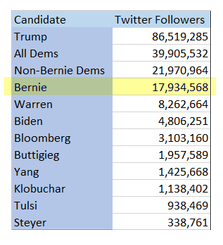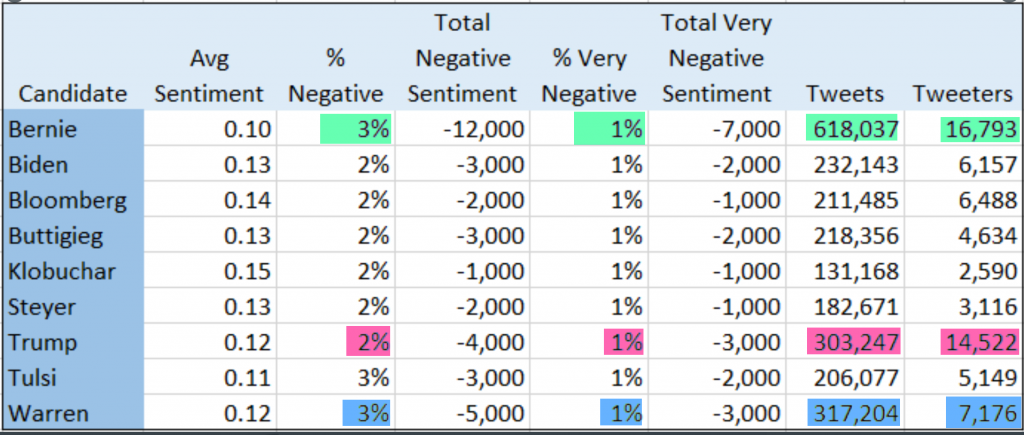I don’t think anyone won this debate, and the interrupting was incredibly annoying. It was like someone at CBS said “hey, people liked the energy and conflict in Nevada … what can we do to replicate that?” and came up with non-moderation and asking borderline offensive leading questions. No winners, but a few exchanges stood out to me.
Stop and frisk was a question Bloomberg knew would be asked. And he knows it’s something other candidates are going to target. I have no idea how he doesn’t manage to come up with something better in his debate prep. I contrast this with Sanders’ response on previous votes against gun control. I thought his response in the former debate — the state in which society existed in the 80’s, and what his constituents wanted in he 80’s, informed his vote. We’ve got different problems now, and he’s got different beliefs now because of this new information. This debate, where he outright called some of his votes bad … that seems like a much better approach on the stop and frisk questions. Bloomberg started down that path:
“I’ve met with black leaders to try to get an understanding of how I can better position myself and what I should have done and what I should do next time.”
But instead of continuing down a path of showing personal growth, he decided to tout his achievements.
“We’ve improved the school system for black and brown students in New York City. We’ve increased the jobs that are available to them. We’ve increased the housing that’s available to them.”
In one way, I get what he’s trying to say. But it was about the worst way I could have imagined saying it. I had an instant “umm, Brown v. Board of Education” mental response. Again, I’m certain he is speaking to the reality which is that there are schools and neighborhoods where a minority is the clear majority. But even a well phrased version of the response falls into Warren’s “so he’s saying he’s nice to some women” response. It’s ok that he made a lot of people’s lives hell for just walking down the street because he also increased funding to the school district?
And I thought that was the oddest bit right up until Buttigieg:
“I am not looking forward to a scenario where it comes down to Donald Trump, with his nostalgia for the social order of the 1950s, and Bernie Sanders with a nostalgia for the revolutionary politics of the 1960s.”
Essentially he is against the civil rights movement? The anti-war movement? The women’s lib movement? Hell, the gay rights movement?! All of which were “revolutionary politics” from the 60’s.
I was surprised that Bernie didn’t have a better response for his previous and current comments about Castro. Taking what Bernie said on Sunday on its own, he’s rejecting a “reductio ad Hitlerum” association fallacy (Hitler liked dogs, thus liking dogs is awful … Castro did a lot of awful things, therefore since Castro did it it was awful). His statements from the 80’s are essentially that there are reasons Castro wasn’t overthrown that Americans don’t understand. Which, in fairness, is totally true. There’s a dearth of communication between Americans and Cubans, so I’m certain there is a great deal of the internal political environment that was (and is) poorly understood. It *is* true, too, that people who opposed Castro were thrown into prison. Which had more impact Castro’s ability to stay in power – appeasement or totalitarianism? Americans don’t know. I doubt Cubans really know, either, since it’s not like we can isolate each input to quantify it’s impact. I’ve visited other countries with totalitarian governments, and I can absolutely say that people accepted reduced freedoms in return for an improved standard of living.
Even saying ‘hey, we could benefit by looking at what Castro did to increase literacy’ … what’s the harm? I mean, maybe ‘what he did’ was mobilize the army and anyone who couldn’t pass a fourth form reading exam has a dude with a Kalashnikov rifle standing over them as they study. Shoot anyone who couldn’t pass the exam and thereby achieved a statistical 100% literacy rate. We can look at that and reject the idea. But maybe ‘what he did’ was offer a grand to every individual who passed the fourth form reading exam and it proved to be a great motivation. Or double the number of teachers in elementary schools. Or funded adult literacy programs in every small town … which are ideas we could certainly try.
We do ourselves a disservice if we reject any idea about anything just because of its source. Hell, we do ourselves a disservice to ignore *bad* ideas from *bad* sources just because they (or the situation which gave rise to them) makes us uncomfortable. I can study something without agreeing to 100% believe and support everything about it. I’ve watched Doc McStuffins with my daughter and don’t believe the toys come alive every time we leave the room (although it *would* explain the mess!). I’ve read Harry Potter but haven’t managed to become a wizard. I think I can study what the Sandinista government did without deciding they had the right way of things, finding an armed mob, and taking over the government next Thursday. I can look at how Cuba increased literacy or started producing low-cost medication without starting a guerrilla war.

